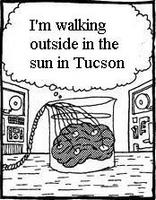

A Thought Experiment: Where Are You?
Where are you? Most people say that they are behind the eyes. Blind people often feel themselves at their finger tips when reading Braille, or at the handle of their cane when walking. Sometimes people feel themselves at the edge of a car as they almost have an accident with a passing vehicle.
But where are you? Plausibly, scientifically, you reside in your central nervous system, your brain. Electrodes attached to its different areas can stimulate various memories, feelings, and movements.
The question remains, though.
As part of a thought experiment originally proposed by Daniel Dennett, assume that your brain has been removed from your skull and placed in a vat of chemicals that nurture it. Your body has total, unimpaired ability to move about, although minus your brain. Instead, in your cranium is a transmitter that sends sights, sounds, touches, and scents, back to the brain. While your body roams freely, your brain remains in the vat, experiencing whatever the body encounters.
Where would you locate yourself? Most people would say they would believe themselves not in the vat but wherever their body goes. They would still feel that they lived somewhere behind the eyes. Only a transmitter is located there.*
So where, then, is the self, this seemingly basic element that everybody senses as present, and discusses as if it is real? What about all the words referring to it--I, you, him, or her? Apparently, because the self cannot be located, they belong to the metaphysics of grammar. (See The Metaphysics of Grammar, 17 January 2004.)
We feel that we are a central observer, but wherever we look we don't find him or her. We are the teller of our tale. We have a narrator, so we believe, and this narration shapes our lives. Where is the narrator?
If we cannot find the teller, then what about the tale? We have memories and hopes. We locate ourselves in space and time. Still, without a teller, where is the tale? (See Perception, 8 December 2003.)
In quantum physics, evidence mounts to indicate that consciousness is non-local. This would not surprise a Ramana Maharshi or a Dogen Zenzi. (For an article on non-local consciousness, see John Bell's Inequality Theorem and Alain Aspect's experiments, in Looking For Reality, 10 November 2003.)
Even non-local consciousness does not fully explain the fact that whenever we look for the self we cannot find it.
For further discussion of the elusive self, see Shakey, Beavers, and Cartesian Theater, 12 February 2004, Cartesian Anxiety, Francisco Varela and The Emergent Self, 6 January 2004 and Benjamin Libet's experiments in Looking for Self, 8 November 2003, as well as various other articles at this site.
For another brain/vat thought experiment, see Brain In A Vat, a different proposal, 20 November 2003.
* (Is this similar to the phantom limb syndrome, in which one feels a foot itching even though the leg was amputated?)
